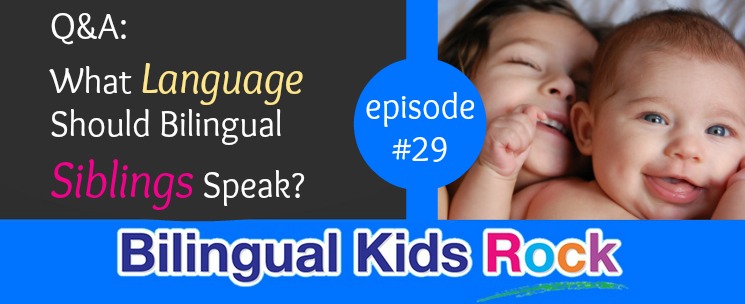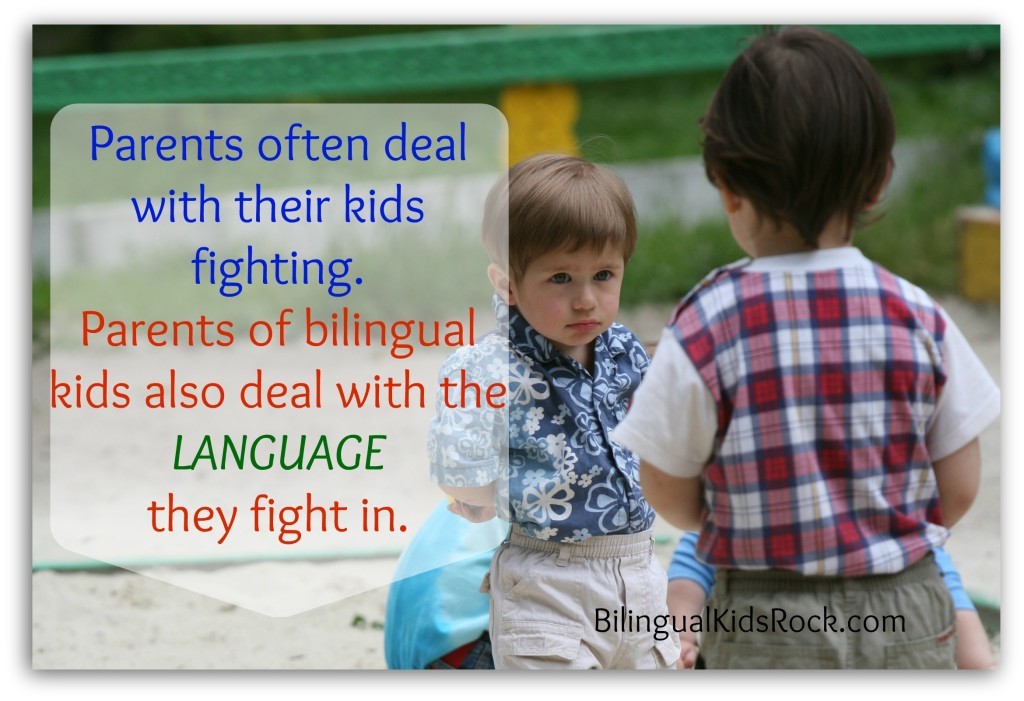
Does this sound familiar?
You speak your language to both of your kids, you motivate them to speak it to you, you spend a lot quality time with them but as soon as you leave the room – they start speaking majority language to each other!
And that is exactly the problem one of our readers has. She writes:
Hi,Thank you for good information on raising bilingual kids. I have a 3 and 6 year old boys. We live in Canada but I’m from Iceland and my boys speak Icelandic as well as English (their dad is English speaking Canadian).You have asked before if we had any questions and I do! 🙂My question is if I can expect my boys to speak Icelandic to each other when they are playing together at home? They always speak Icelandic to me and can play in Icelandic with other Icelandic kids (as long as those don’t know English). I’d love for them to only use Icelandic at home when their dad is not home. Is that realistic or should I just be happy that they speak Icelandic too me! I always speak Icelandic to them, even when we are outside the home or with English friends.Thank you.
So what do you do in this situation? Should you drop everything you are doing and rush back to your kids to play with them in Icelandic? Or maybe you should raise you finger and voice and say “Speak Icelandic please young men, or no desert today? Or maybe you should relax and do nothing?
When we did our road trip throughout USA back in 2013, we stopped by my husband’s sister in Washington. She took us to see the waterfall Multnomah – the view leaves you breathless, its so tall and gorgeous!
But, my kids had to start arguing about something in English. I quickly stopped them, but my sister in law did not understand and she asked me what did I say? I translated to her that I told them they can fight only in Russian. She found it hilarious and was laughing all the way to the ticket stand.

In general, our kids speak Russian to each other on household topics and with me, but the language of their play is almost always English.
I should confess I was sad about it, I thought that they are loosing their Russian.
But, I felt much better after rereading Francois Grosjean’s book Bilingual.
It is really important to understand that bilinguals use their languages with different purposes
Francois Grosjean calls it complementary principle.
He says:
Bilinguals usually acquire and use their languages for different purposes, in different domains of life, with different people. Different aspects of life often require different languages.
Your bilingual children are the same way – they have different domains of their life: home, friends, schools and daycare, playing (which is a big part for them).
Barbara Zurer Pearson, the author of Raising A Bilingual Child conducted report with on of the students in the University of Miami. Here what they found:
Even first generation children switched to English among themselves within a very short time of arriving in this countryThere is strong preference for English among young bilinguals. While children in dual-immersion schools cooperate excellently with the policies on language choice in the classroom curriculum, they overwhelmingly preferred to use English with each other in the halls and on the way to the bus.
Relationships with parents is one domain of their life, but relationship with siblings is entirely different. So even if they speak your mother tongue with you, they can choose majority language when conversing with siblings.
What are the factors that can influence language choice between siblings?
- older sibling’s stronger language when younger one comes along
- the language children prefer in their play
- the age of the siblings – they can use minority language when they are younger and switch to majority when they enter schools)
- how much time parent(s) of minority language spend with them when they interact
- if children attend daycare or school
- level of your encouragement
- habit
But.
Even though some factors are beyond our influence, I think parents still need to try steering the communication between siblings into the minority language. Why? Because this way you will have much more of your language in the household, and your kids will have much more practice speaking it. Practice makes perfect!
What should you do when younger sibling arrives:
- build your older child’s vocabulary
- give tons of encouragement to your older child to speak minority when younger one joins the family
- if he/she is old enough explain the reasons why you should team up to teach baby brother or sister minority language (to be able to speak to grandma, to travel to you home country, to read heritage books, to get presents from your culture’s Santa etc)
- spend time together more often interacting with baby when older sibling is around
What should you do when kids are good talkers:
- Build their vocabulary to ensure that interacting in minority language is not very hard for them. It is especially important to match the vocabulary that he/she learns in the majority language settings (like school for example)
- Arrange playdates with children who do not speak your kids’ majority language (freshly arrived families from your homeland)
- Play with them!
- Show the benefits of speaking your mother tongue (“it could be your secret language”)
- read books, a lot of books
- if you hear them switching to majority language, involve yourselves into their activity. Sometimes just couple phrases that you will say can trigger the whole switch to your mother tongue between them
- gently ask them to speak minority language. I usually also include the reason why. “Lana, could you please speak Russian to Katia, she will be really sad if she cant understand what we are saying”
- continue address them in the minority language even if they address each other in the majority.
- play minority language music on the background.
What you should not do:
- become the language police. “Speak Icelandic to your brother, or I wont let you watch cartoons”
- expect minority language use in the areas where your child knows only majority vocabulary. For instance, he was watching Transformers in the majority language and now he is modeling it in his game.
- Put language of the communication above their relationships with each other. After all, them playing together is actually one of the best memory of their childhood.
To sum up my answer to you question – yes, I think it is perfectly normal for siblings to use majority language with each other.
But gently steering them towards minority language and practicing all of the methods I mentioned above would not hurt at all.
The key is gently, never head to head.
